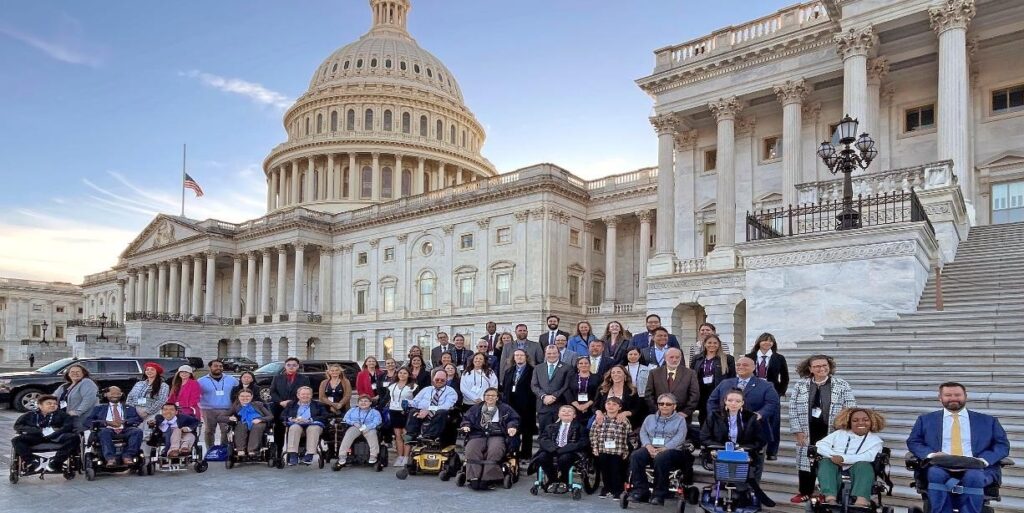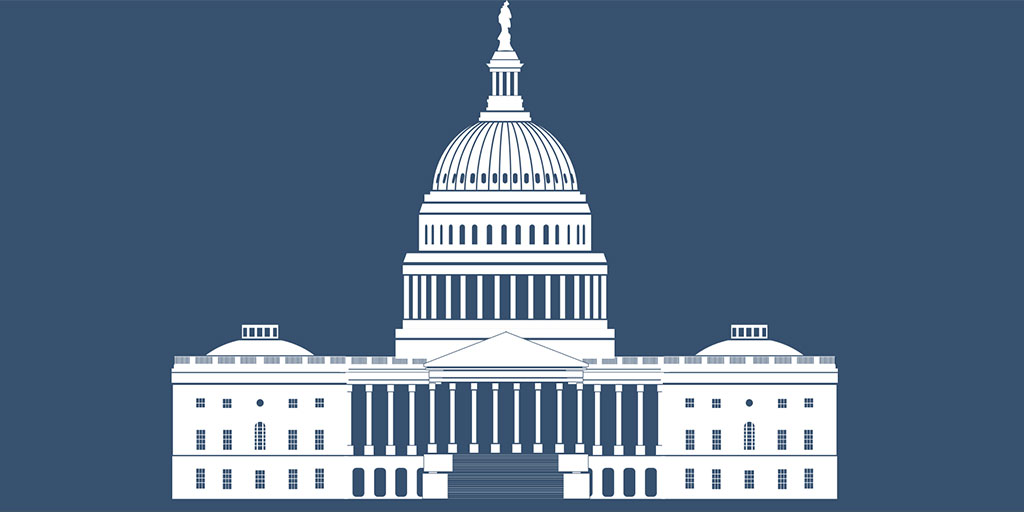
Reporting Back from the MDA Public Policy and Advocacy Conference — and Keeping Up the Momentum
By Chris Anselmo | Thursday, October 24, 2019
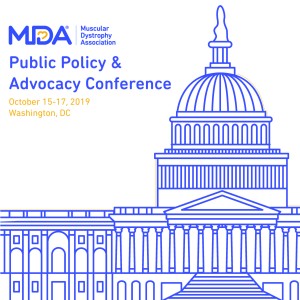 Two years ago, I remember looking through the photos from the MDA Public Policy and Advocacy conference, excited to see so many in the neuromuscular disease community on Capitol Hill advocating for issues important to our community. I felt a sense of pride at what they were doing, but also, selfishly, a little bit of disappointment. I wanted to be there with them!
Two years ago, I remember looking through the photos from the MDA Public Policy and Advocacy conference, excited to see so many in the neuromuscular disease community on Capitol Hill advocating for issues important to our community. I felt a sense of pride at what they were doing, but also, selfishly, a little bit of disappointment. I wanted to be there with them!
This year, I got my chance.
Last week, on two cold (and very windy) October days, I had the pleasure of attending the 2019 MDA Policy and Advocacy Conference in Washington, D.C. More than 90 people attended, including my own family. Although we came from different parts of the country and represented every demographic and disease type, we were all motivated by the same purpose: to share our collective experiences with our elected representatives in order to effect change.
There was palpable excitement in the air, but also a sense of purpose and determination. We were here for a reason.
Day 1
The conference began early in the morning on Wednesday, Oct. 16. Kristin Stephenson, MDA’s chief Advocacy and Care Services officer, opened the conference by giving an overview of several policy issues that are important to the community and how they align with the current legislative landscape.
It was at this point that attendees were introduced to the three issues on which the conference would focus: expanding access to early disease detection and intervention through newborn screening, improving air travel accessibility, and protecting the Orphan Drug Act. Subsequent panels did a deep dive into each issue and featured perspectives from those who have advocated for these issues before.
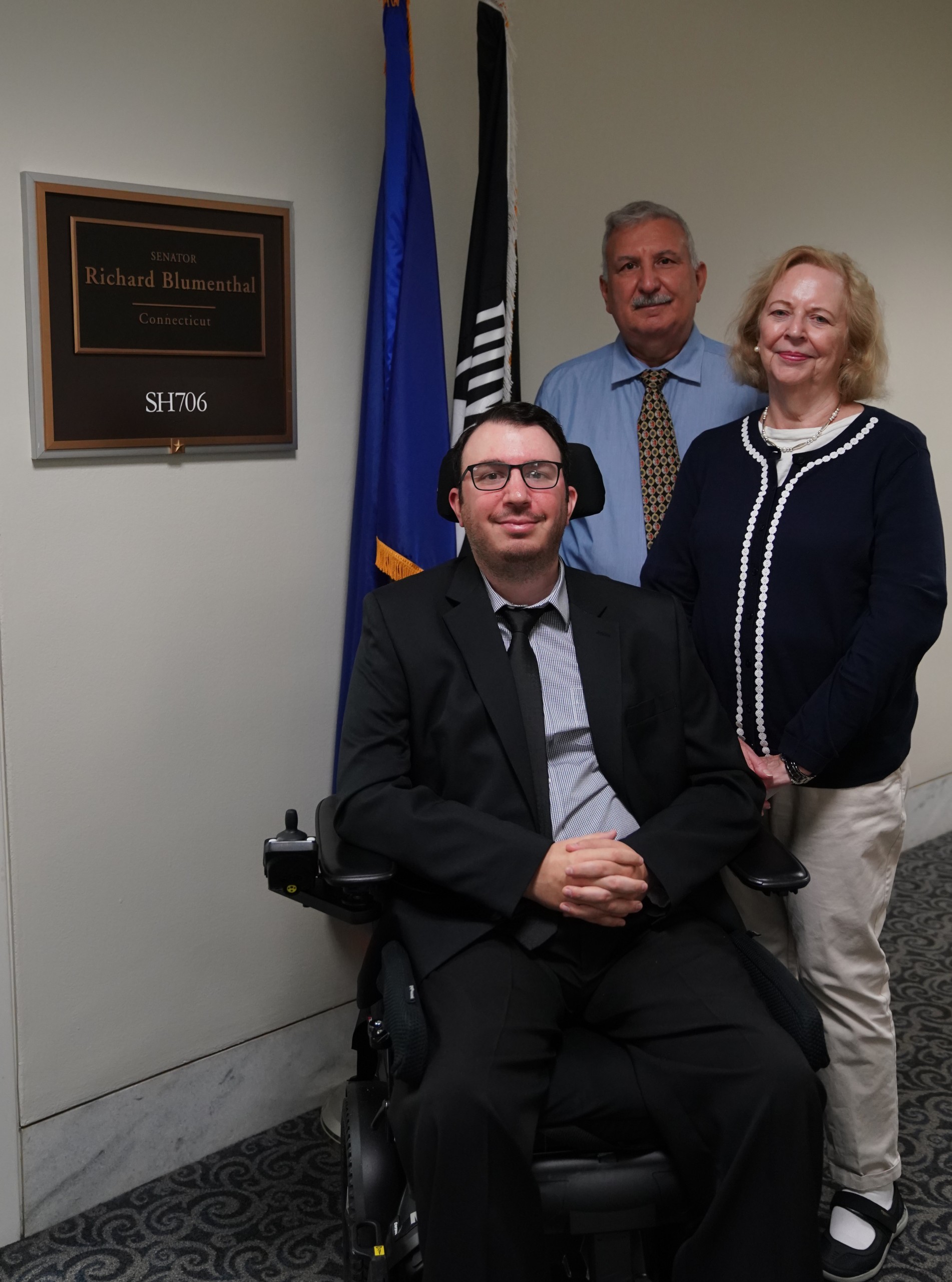
Chris Anselmo with his parents. Photo by Sarah Silbiger.
Many organizations work alongside MDA on these issues and were generous enough to send representatives to the conference, including March of Dimes (which supports newborn screening), Paralyzed Veterans of America (which supports air travel), and the Friedreich’s Ataxia Research Alliance (which supports the Orphan Drug Act). MDA’s community isn’t the only one affected by these policy issues, and we are grateful to have supportive partner organizations. Congressional office staff members represented policymakers’ perspectives, too, during panel discussions.
(You may be thinking: Why was (x issue) not discussed? The truth is, there are many issues that are top of mind for our community, it’s impossible to give ample time to each issue during a one-day conference. Also, when we have our discussions on Capitol Hill, we only have 10-15 minutes, so sharing a concise message is key.)
The three topics that were emphasized are of vital importance to the MDA community, and it was interesting to learn about each.
Early detection and intervention through newborn screening
Since 2015, two neuromuscular diseases, Pompe disease and spinal muscular atrophy (SMA), have been added to the Recommended Uniform Screening Panel (RUSP), a list of diseases the federal government recommends that states screen for in newborns. As states adopt the nonbinding recommendation of the RUSP, more and more babies are being identified and can benefit from life-saving therapeutic interventions now available. With the scientific breakthroughs happening each year, many more neuromuscular diseases, such as Duchenne muscular dystrophy (DMD), may be added to the RUSP in the next few years.
However, the committee that monitors and analyzes what diseases to nominate for the RUSP requires federal authorization to exist, and as of Sept. 30, 2019, that authorization has lapsed. The Newborn Screening Saves Lives Reauthorization Act of 2019 (H.R. 2507, S 2158) seeks to restore this authorization, restore funding to the grant program that helps states update their newborn screening (NBS) programs, and restore funding to track outcomes of NBS and fund promising new technology to better screen for diseases.
The House of Representatives has passed the reauthorization act, but the Senate has yet to take up the issue. Given the importance of NBS, it is essential this program is reauthorized. We urged our senators to understand the importance of NBS and why this is an urgent issue that can be a matter of life or death to so many.
Air travel
Ah, the joys of flying.
I could write 10,000 words about the perils of air travel, but if you are reading this article, you are likely well aware of the pitfalls, from damaged wheelchairs to inaccessible bathrooms.
My parents and I made the decision this year to drive to conferences rather than fly. Although it takes much, much longer to drive to Orlando, Philadelphia, and Chicago from Connecticut, where we live, it is still less of a hassle than flying.
I was shocked, but not entirely surprised, to learn that the requirements of the Americans with Disabilities Act (ADA) do not apply to air travel. Although the Air Carrier Access Act (ACAA), which passed more than 30 years ago, was meant to curtail discrimination in air travel on the basis of disability, thousands of travelers still experience discrimination and inaccessibility. Trains and buses must be ADA compliant, but flying in an airplane is like taking a time machine to a previous generation.
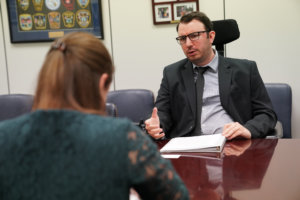
Photo by Sarah Silbiger.
To modernize the ACAA, the Air Carrier Access Amendments Act (ACAAA) was introduced by Sen. Tammy Baldwin of Wisconsin and Rep. James Langevin of Rhode Island to provide additional protections for individuals with disabilities who are traveling by plane. The amendments would strengthen the enforcement of nondiscrimination protections for travelers, ensure that new aircraft are designed to accommodate passengers with disabilities, and improve access to convenient seating accommodations. This bill would go a long way toward ensuring the planes of the future are better equipped for persons with disabilities. Perhaps we may be able to fly in our own wheelchairs, which would be nice!
The ACAAA is currently hung up in the House (H.R. 1549) and Senate (S. 669). Our ask for members of Congress is to co-sponsor the bills in order to display strong support for passage.
Protecting the Orphan Drug Act
The last topic of discussion was the Orphan Drug Act (ODA). The ODA, passed in 1983, provides critical incentives for drug companies to develop therapies for rare diseases. Because rare disease populations are so small, it was not previously feasible or lucrative for companies to spend significant sums of money on research and development to find therapies for these conditions.
Since 1983, 11 new therapies for eight neuromuscular diseases have been approved by the US Food and Drug Administration (FDA), and these therapies can be traced back to the incentives granted by the ODA. Many more therapies are in development that could help treat neuromuscular diseases that have yet to benefit from a transformative therapy.
However, the law is not perfect, and there have been instances where companies have utilized the ODA in ways not originally intended. As a result, some lawmakers feel the ODA should be weakened or scrapped altogether. Our ask was to ask Congressional supporters to share the pros of the ODA with lawmakers and encourage improvement over abandonment when considering the law’s fate.
Learning to advocate
With our policy asks clear, a team from Washington-based Soapbox Consulting guided us through how to interact with our elected representatives. We learned what to expect on “Hill Day,” including how to conduct ourselves in meetings, what topics to emphasize vs. what topics to avoid, and how to end meetings by sharing our asks. Most members of Congress would not be able to attend the meetings given their tight schedules, so we had to be prepared to speak with legislative staff.
At the end of the day, we paired up with advocates from our home states, who would be making the trip with us to Capitol Hill and, when practical, joining the same meetings. Sadly, my parents and I were the only ones from Connecticut, so we prepared to handle the Nutmeg State circuit alone.
As I pored over notes and one-page talking points before bed, I thought of how everyone else was likely doing the same. It was heartening to see so many advocates learn about the issues throughout the day, ask insightful clarifying questions, and become policy experts by day’s end.
Hill day
After a restless night’s sleep, my parents and I got up early on Thursday morning and prepared for the day ahead. I drank my coffee and dove deep into my notes one last time, trying to memorize as much of the information as possible.
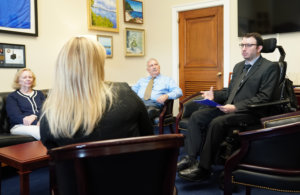
Photo by Sarah Silbiger
My first meeting was at 10 a.m. with a legislative staffer in Sen. Richard Blumenthal’s office in the Hart Senate Office Building. I had been to the building before, 15 years earlier, so it was vaguely familiar, which helped to put my nerves at ease once I arrived.
In truth, I had nothing to worry about. The meeting went off without a hitch. I did most of the speaking and was pleased to realize that I had retained the information far better than I thought. Combined with my notes at hand, I spoke from the heart about the importance of the three issues. My parents also contributed to the discussion, and we made a great team. After all, caregivers have just as much valuable insight into these issues as the patients themselves.
Sen. Blumenthal’s staffer took a lot of notes and understood the importance of the asks, which I appreciated. My other two meetings, with a healthcare policy staffer in Sen. Chris Murphy’s office and the legislative director in Rep. Joe Courtney’s office, also went smoothly. By the third meeting I didn’t even need to refer to my notes.
My mom remarked at the end of our last meeting that I would make a good politician.
I laughed. Maybe someday, but not now. I’m happy with my day job.
Continuing the momentum
Looking back at last week, I realize that I have not been as in tune as I should have been with the advocacy issues that are important to our community. Although I intuitively understand the importance of the topics, this conference was a wake-up call. I can, and should, be doing more.
I have gotten to know dozens of members of the neuromuscular disease community in the last few years, and I am inspired and awe-struck by their determination and passion. We are a fierce community, one that will not settle for the status quo when the status quo needs to be disrupted. Enacting change at the legislative level is not simple or for the faint of heart. I wish it was easier. But if those families who attended the conference are just a subset of the neuromuscular disease community as a whole, I know we are up to the task.
For better or worse, there is still so much work yet to be done. Passing laws that positively impact our community takes time, whether on the state or federal level. It means showing up, month after month, year after year. Maybe even week after week. With all that is going on in the world, the issues that impact our lives can often be drowned out amid the noise. But it is important that we continue to show up, meet with our elected representatives, and share our perspectives.
And make no mistake: Every patient and caregiver perspective is valuable and worth being heard by those in elected office.
Disclaimer: No content on this site should ever be used as a substitute for direct medical advice from your doctor or other qualified clinician.




